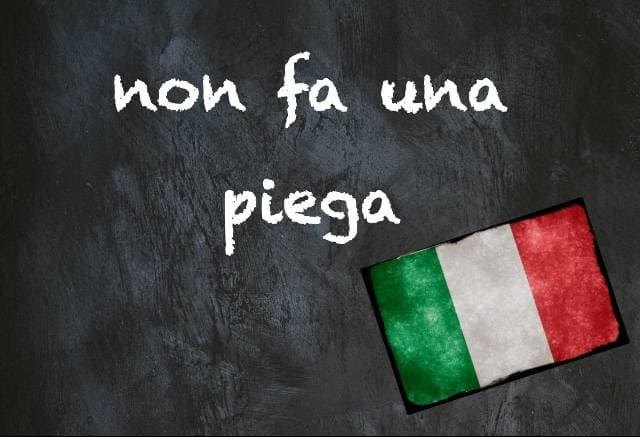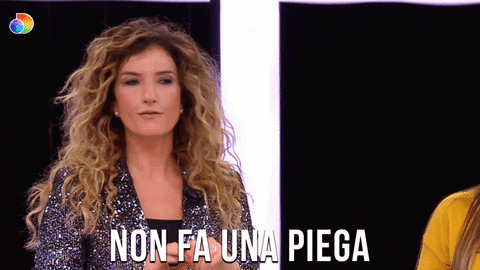Italian expression of the day: 'Non fa una piega'

You won't put a foot wrong - or be wrong-footed - with this Italian phrase.
If you watch Italian TV, from time to time you'll hear political or sports commentators say admiringly that an athlete or politician non fa una piega or non ha fatto una piega. But what are they talking about?
A piega is a crease or wrinkle, of the kind you might see on a bedsheet or someone's clothing.
Non fare una piega, then, literally means to not make a wrinkle or a crease - to be perfectly smooth or flawless.
If you're referring to someone's argument, speech, or reasoning, it means it is perfectly sound, that it makes complete sense, that it holds water.
Dovete ammettere che il suo ragionamento non fa una piega.
You have to admit his reasoning is water-tight.

If you're in Rome, listen out for nun fa na piega, the dialect version. You'll also sometimes hear non fa una grinza, which has the same meaning.
But non fa una piega is also used to describe someone remaining totally unfazed when confronted with a situation that would make most people flinch. To not bat an eyelid, or to take something in one's stride, we might say in English.
This one you'll almost always see in the past tense (just as you'd tend to say that someone 'didn't bat an eyelid' in English).
Non ha fatto una piega quando è entrato il suo ex.
She didn't even flinch when her ex walked in.
Se fosse capitato a me, non avrei fatto una piega.
If it had happened to me, I'd have taken it in my stride.
You might assume that the piega here refers to lines on someone's face - that they remain so impassive that their expression is wrinkle-free.
But a face wrinkle is actually a ruga; the absence of a piega here refers more to their comportment than to their appearance.
An alternative expression here is non ha battuto ciglio: a direct translation of 'he/she didn't bat an eyelid'.
Non ha battuto ciglio quando gli ho detto che la sua casa era stata svaligiata.
He didn't bat an eyelid when I told him his house had been burgled.
Now you've mastered this expression, you'll be able to go about your business unfazed - no matter what life throws at you.
Do you have a favourite Italian word you'd like us to feature? If so, please email us with your suggestion.
Comments
See Also
If you watch Italian TV, from time to time you'll hear political or sports commentators say admiringly that an athlete or politician non fa una piega or non ha fatto una piega. But what are they talking about?
A piega is a crease or wrinkle, of the kind you might see on a bedsheet or someone's clothing.
Non fare una piega, then, literally means to not make a wrinkle or a crease - to be perfectly smooth or flawless.
If you're referring to someone's argument, speech, or reasoning, it means it is perfectly sound, that it makes complete sense, that it holds water.
Dovete ammettere che il suo ragionamento non fa una piega.
You have to admit his reasoning is water-tight.

If you're in Rome, listen out for nun fa na piega, the dialect version. You'll also sometimes hear non fa una grinza, which has the same meaning.
But non fa una piega is also used to describe someone remaining totally unfazed when confronted with a situation that would make most people flinch. To not bat an eyelid, or to take something in one's stride, we might say in English.
This one you'll almost always see in the past tense (just as you'd tend to say that someone 'didn't bat an eyelid' in English).
Non ha fatto una piega quando è entrato il suo ex.
She didn't even flinch when her ex walked in.
Se fosse capitato a me, non avrei fatto una piega.
If it had happened to me, I'd have taken it in my stride.
You might assume that the piega here refers to lines on someone's face - that they remain so impassive that their expression is wrinkle-free.
But a face wrinkle is actually a ruga; the absence of a piega here refers more to their comportment than to their appearance.
An alternative expression here is non ha battuto ciglio: a direct translation of 'he/she didn't bat an eyelid'.
Non ha battuto ciglio quando gli ho detto che la sua casa era stata svaligiata.
He didn't bat an eyelid when I told him his house had been burgled.
Now you've mastered this expression, you'll be able to go about your business unfazed - no matter what life throws at you.
Do you have a favourite Italian word you'd like us to feature? If so, please email us with your suggestion.

Join the conversation in our comments section below. Share your own views and experience and if you have a question or suggestion for our journalists then email us at [email protected].
Please keep comments civil, constructive and on topic – and make sure to read our terms of use before getting involved.
Please log in here to leave a comment.